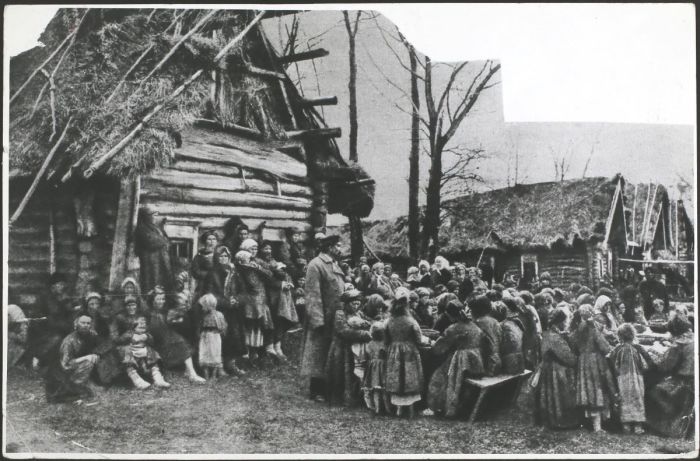Revelation 6: The rider on a black horse brings hunger

Winnie Byanyima — Ugandan politician, human rights activist, and diplomat — said: “Conflict and callous politics drive famine.” Famine is intense suffering, and the people who die from it die slowly and incrementally.
In the mid-1990s, there was a terrible famine in North Korea, and more than a million people died. North Korean defector and activist Lee Hyeon-Seo, said that those who survived ate only grass and bugs.
During the great famine in Russia from 1932-1933, a peasant described the famine in this way: “We’ve eaten everything we could get our hands on — cats, dogs, field mice, birds. You will see the trees stripped of their bark when it’s light tomorrow. And the horse manure has been eaten. Sometimes there are whole grains in it.”
In modern times, especially in nations located in the West, famine is associated with antiquity. Nevertheless, famine has never been abolished, and Revelation Chapter 6 predicts a period of unprecedented worldwide famine.
In Chapter 6, the apostle John has been lifted and raptured into Heaven, where he awaits for Christ to break the third seal of a scroll — a scroll only he was worthy to open. As Christ breaks the seals of this scroll, a new interval of God’s plan for the earth’s final days is laid bare.
With the breaking of the first two seals of the scroll’s total of seven, the apostle reported that riders on a white horse and a red horse appeared. The white horse and its rider represent deception and the devil’s “man of sin,” the Anti-Christ. The second rider on the red horse symbolizes war, more specifically, worldwide conflicts of nation against nation, and civil wars, assassinations, murder, and mayhem, which saturate the ground everywhere with blood.
Then, the apostle says,
“When the Lamb [Christ] broke the third seal, I heard the third living being say, ‘Come!’ I looked up and saw a black horse, and its rider was holding a pair of scales in his hand. And I heard a voice from among the four living beings say, “A loaf of wheat bread or three loaves of barley will cost a day’s pay. And don’t waste the olive oil and wine” (Revelation 6:5-6).
Like the children playing the board game Jumanji, who rolled the dice in the 1995 movie of the same name, animals and creatures suddenly emerged to present dangerous challenges. When Jesus broke the third seal of the scroll, an individual carrying a set of scales mounted on a pitch-black horse materialized. This rider presents a challenge: millions worldwide will not likely survive, the peril of hunger and starvation.
Deception disseminated by fraudulent leaders often capitulates nations into war, and war leads to death and deprivation. As a result of World War I and the revolutions which followed, 27 million people starved to death. As many as 20 to 25 million died of hunger and hunger-related diseases because of World War II.
During conditions of hostilities, farmers find it difficult to plant and harvest because the land is ravaged. Moreover, marauding armies take away their crops. There are also supply chain issues. Food scarcity can skyrocket prices, production, and distribution expenses.
In the book, Four Views on the Book of Revelation, C. Marvin Pate contends:
“The inevitable consequence of war is famine, nowhere is this so starkly depicted as in Revelation 6:5-6, with its description of the third horseman. It would have been easy for the seer of the Apocalypse to envision war and famine. During Claudius’s reign, famine occurred in Rome A.D. 42, and food shortage was reported in Judea in 45-46, in Greece in 49, and in Rome again in 51. The reference to the pair of scales and the inflated prices for food in 6:5-6 cannot help but recall the severe famine that occurred in Jerusalem during its siege by the Roman army. During that time, the inhabitants of Jerusalem had to weigh out their food and drink because of the scarcity of those necessities. So severe was it that even a mother’s love for her child ceased. Josephus records the story about Mary, a woman from Perea, who was among the Jews starving in Jerusalem during its siege. She seized her child and infant at her breast, slew it, and roasted it for food for herself.
“Note this also from Josephus concerning the role of the famine during the Jewish war against Rome:
“‘But the famine was too hard for all other passions, and it is destructive to nothing so much as modesty; for what was otherwise worthy of reverence, was in this case despised; inasmuch that children pulled the very morsels that their fathers were eating, out of their very mouths, and what was still more to be pitied, so did the mothers do as to their infants.'”
Some would argue that what John was already familiar with was what he was actually citing in the prophecy of the rider on the black horse. They say the black horse already rides. Indeed, there have been wars and famines on various levels throughout human history. There is a sense in which the assertion is true. However, what John references is a collective of such circumstances rising and building toward a future catastrophic paucity on a global scale. What’s being described is the wrath of God stored up until the cup runs over on a Christ-hating, Bible-hating, blaspheming, grace-despising, and unbelieving world. The world’s godless masses are finally getting their just comeuppance.
Revelation 6:6 says the rider on the black horse is to spare the luxuries of the “olive oil and the wine.” In other words, this period of tremendous tribulation on the earth will be when almost everyone everywhere, except the very rich, will find too little of what is desperately needed and an overabundance of what isn’t.
Dr. Henry Morris, in his book Creation and the Second Coming, argues the epistle of James, chapter 5:1-8 “is a graphic prophecy of social unrest in the last days.” The text reads:
“Look here, you rich people: Weep and groan with anguish because of all the terrible troubles ahead of you. Your wealth is rotting away, and your fine clothes are moth-eaten rags. Your gold and silver are corroded. The very wealth you were counting on will eat away your flesh like fire. This corroded treasure you have hoarded will testify against you on the day of judgment. For listen! Hear the cries of the field workers whom you have cheated of their pay. The cries of those who harvest your fields have reached the ears of the Lord of Heaven’s Armies.
“You have spent your years on earth in luxury, satisfying your every desire. You have fattened yourselves for the day of slaughter. You have condemned and killed innocent people, who do not resist you.
“Dear brothers and sisters, be patient as you wait for the Lord’s return. Consider the farmers who patiently wait for the rains in the fall and in the spring. They eagerly look for the valuable harvest to ripen. You, too, must be patient. Take courage, for the coming of the Lord is near.”
Morris says these verses show “[t]he eternal conflict between rich and poor, capital and labor, master and slave, was evidently going to become more intense than ever before in the last days, finally erupting in weeping and howling and miseries and in a great “day of slaughter.” He adds:
“This prophetic sign began to be fulfilled in the Industrial Revolution, which generated great technological advances but also brought about great misery to the laboring classes who were exploited mercilessly in the factories and fields of the rich owners – perhaps never more so than in the slave plantations of the Americas. All of this did result in the bloody French Revolution and then later many even more horrible Communist revolutions in Russia, China, and other countries, not to mention America’s unspeakable Civil War.
“While these days of slaughter may to some degree have mitigated the lot of the laboring masses, they also resulted in many cases in even more wealth and power for the great and mighty, as well as the ruthless new dictators in many nations. In many cases, in fact, it is known that the bourgeoise — were actually instigated and financed by certain international bankers and leading merchants of Europe and America, with the aim of producing greater riches and power for themselves. These war millionaires nourished their hearts in days of slaughter!
“In these verses, however, James is telling people not to look to revolutions or legislation for their deliverance but to look for ‘the coming of the Lord,’ which all these signs foretell. Today the lot of multitudes of the poor is perhaps worse than ever (think of the poverty-stricken populations in Ethiopia, India, Sudan, and many other nations, including those recently escaping from Communist [and Socialist] exploitation – perhaps even of the increasing numbers of homeless people…in America), and this sign of the last days becomes more poignant than ever. The real hope, James says, is that ‘the coming of the Lord draws near.'”
Does the prospect of these future events symbolized in these horsemen strike you with fear and trembling? If you have never received Christ for the forgiveness of your sins, you should be afraid. When fear leads us to a positive conclusion or helps us avoid danger, it is a good thing.
Terrible disasters are on the horizon for those who ignore God’s kindness in Jesus Christ. But the saved can look up confidently, knowing their redemption draws near (Luke 21:28).
Rev. Mark H. Creech is Executive Director of the Christian Action League of North Carolina, Inc. He was a pastor for twenty years before taking this position, having served five different Southern Baptist churches in North Carolina and one Independent Baptist in upstate New York.




























